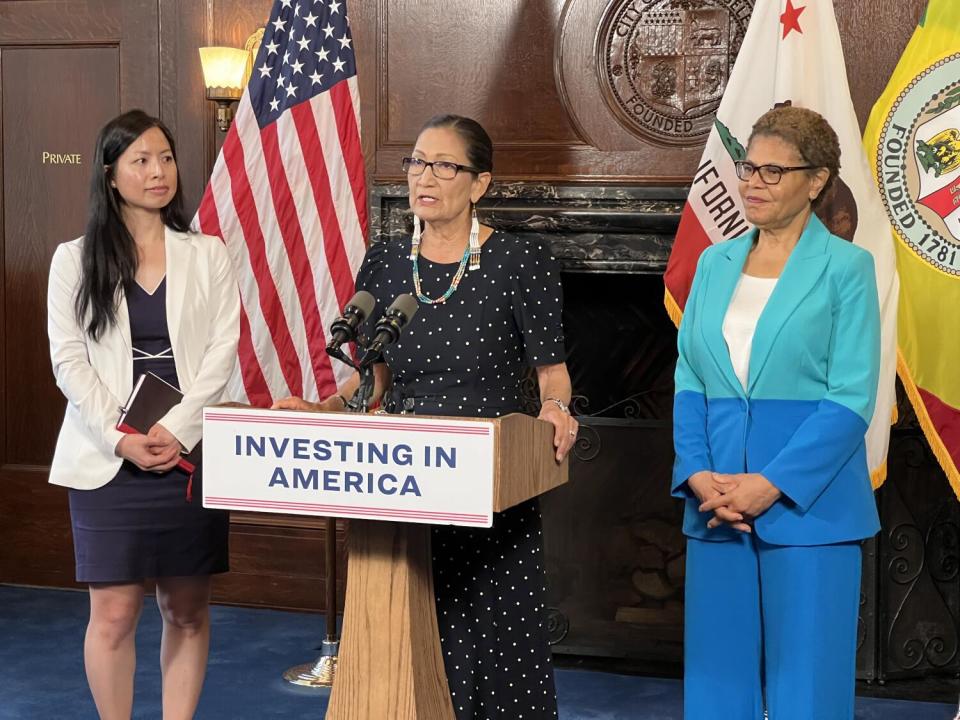California will receive more than $35 million in federal funding to help resolve the scourge of abandoned oil wells that are leaking dangerous chemicals and planet-warming methane into areas across the state, including many in Los Angeles.
The Biden-Harris administration’s investment is among the “largest ever in American history to address legacy pollution,” the US Secretary of the Interior said. Deb Haaland said Friday during a joint announcement with the mayor of Los Angeles Karen Bass and California Deputy Secretary of Energy Le-Quyen Nguyen.
California will use the funding to plug and remediate 206 high-risk orphan oil and gas wells and decommission 47 concurrent production facilities with approximately 70,000 feet of associated pipelines.
“Cleaning up dangerous orphan wells and addressing legacy pollution across our country will have a profound impact on our environment, water quality, and the health and well-being of our communities,” Haaland said.
The Golden State is home to at least 5,300 abandoned or orphaned oil wells — or wells for which there are no legally responsible parties to plug them — according to estimates from the California Division of Geological Energy Management. There are more than 35,000 known idle wells, with thousands more soon to reach the end of their lives.
Many are located in and around communities where residents have become sick from their toxic emissions. What’s more, many unblocked wells leak methane, a planet-warming gas that is 25 times more powerful than carbon dioxide at trapping heat in the atmosphere.

“We have thousands of orphan wells in California, and each well poses a risk to public health, safety and the environment, as well as further contributing to climate change,” Nguyen said. “The funding that was announced today by Secretary Haaland will continue our momentum to plug these orphan wells in California, as well as to remediate these sites and remove this legacy of pollution. It will also have a significant and positive impact on our communities, as well as creating good jobs.”
California’s award is part of a larger $660 million grant formula that will be released to states on an ongoing basis, Haaland said.
As part of the award, California will also work to detect and measure methane emissions from orphan oil and gas wells, examine impacts on groundwater and surface water, and prioritize cleanup of wells near disadvantaged communities.
See more information: Newsom signs bills to address unplugged oil wells and disclose corporate greenhouse gas emissions
The grant program is the result of a global assessment Investment of US$4.7 billion of President Biden’s Bipartisan Infrastructure Act to plug orphan wells across the country.
Other funding pools include more than $565 million in seed grants that have already been awarded to 25 states, including $25 million to California. A planned supplemental grant program will also award up to $30 million each to states that commit to increasing their spending on cleaning up orphan wells.
Bass said it’s too early to specify how much of the state’s latest award will go to Los Angeles. However, state officials said some of the initial funding is being used to plug 19 wells that remain uncapped in the AllenCo drilling site in South Los Angeles, which are among more than 370 high priority wells identified in the first round of planning.
Residents living near AllenCo facilities have complained for years of headaches, nosebleeds, respiratory illnesses and other health problems. Among them is Nalleli Cobo, who grew up about 10 meters from the site and was diagnosed with reproductive cancer at age 19.
“I lost my childhood to the fossil fuel industry and I also lost my future to the fossil fuel industry, and that is not the reality our community should face,” Cobo said. “When you ask a person what a community belongs to, few people will say it’s an oil well.”
She noted that about 18 million Americans live one mile or less from an active oil or gas well.
Friday’s federal investment announcement is “definitely a step in the right direction,” she said, “but we need to make sure we’re prioritizing communities like sacrifice zones, because we are the frontline communities who live day in and day out breathing these toxic emissions.”
See more information: California lawmakers have a plan to plug old oil wells that spew steam. Could the plan backfire?
Officials said latest round of funding advances Biden initiative Justice Initiative40, which aims to provide at least 40% of the benefits of certain climate, housing and energy investments to disadvantaged communities.
“This is an environmental justice issue,” Bass said. “Today we stand shoulder to shoulder across city, state and federal governments to continue our work to end oil drilling in Los Angeles city neighborhoods to protect the health of Angelenos and advance our vision of environmental justice.”
Since the enactment of Biden’s Bipartisan Infrastructure Act in 2021, states have plugged more than 7,700 orphan wells and reduced approximately 11,530 metric tons of potential methane emissions, according to the Department of the Interior.
Governor Gavin Newsom in October also passed AB 1167, legislation that will require companies that acquire oil wells to secure bonds to properly seal the wells once their use has ended. Some local communities, like Culver City, have banned new drilling and are moving to phase out existing wells.
“California is one of the states leading the way in putting these new resources to work, because it will take all of us working together to ensure we are making the kind of lasting impact that will last for generations to come.” Haaland said.
But while the federal support is encouraging, there’s still a lot of work ahead, said Brenda Valdivia, a longtime resident of Los Angeles’ Vista Hermosa Heights neighborhood.
Valdivia said he developed an autoimmune disease and had two strokes after exposure to nearby wells.
“We could always do more,” she said.
Times staff writer Tony Briscoe contributed to this report.
This story originally appeared on Los Angeles Times.
































